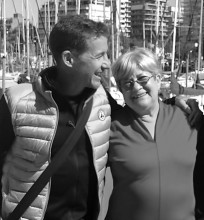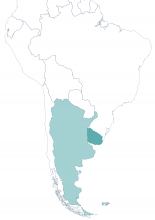Sara Méndez was born in Montevideo in 1944, where she participated from a young age in Christian groups with a strong social commitment. During her teacher training, she started a trade union movement and a course on socio-pedagogical experiences in rural areas. She firstly became involved in the Federación Anarquista Uruguaya (Uruguayan Anarchist Federation, FAU) and later joined the student branch of the Organización Político Revolucionaria 33 Orientales (Popular Revolutionary Organisation- 33 Orientales).
Following the coup d'état in June 1973, Sara and the other members of her political group made the joint decision to move to Buenos Aires.
In 1974, the activities of extreme-right para-police groups intensified their violence and persecution to include coordinated repression that predated Operation Condor. Meanwhile, Uruguayan exiles started to organise themselves in Argentina and Sara actively participated in the congress that founded the Partido por la Victoria del Pueblo (Party for the Victory of the People, PVP) in 1975.
On 24th March 1976, Argentina suffered a coup d'état, which immediately triggered the heightening of political persecution. In particular, this year saw the kidnapping of over 50 PVP militants in Buenos Aires in two waves: firstly between June and July, and secondly between September and October.
On 22nd July, Sara gave birth to her son in a Buenos Aires hospital. She was using a fake identity document under the name of 'Stella Maris Riquelo' and registered her son as 'Simón Riquelo'. She was living with a fellow female militant and her partner, Mauricio Gatti, to reinforce their security mechanisms following the capture of many of their companions.
On 13th July, a group of Uruguayan and Argentine repressors led by Major José Nino Gavazzo entered Sara's apartment. Sara was taken to the 'Automotores Orletti' clandestine detention and torture centre. Later, on 24th July, she was secretly transferred via a Uruguayan Air Force flight to Montevideo and was detained or disappeared until November. During this first period of repression, she was detained in the clandestine detention and torture centre known as 'Casona de Punta Gorda' and later in the clandestine centre that functioned as the headquarters of the Uruguayan military intelligence service, the Servicio de Información de Defensa (Defence Information Service, SID).
Sara was tried by the military justice system and confined to political prisons in Uruguay, along with a group of other victims who survived the capture in Buenos Aires. She heard no news of her son, who was only 21 days old when he was separated from her. Once Sara was released in 1981, she immediately intensified her claim and search for her son.
In 1984, when Uruguay remained under the dictatorship, Sara travelled to Buenos Aires. She hoped to trace the whereabouts of Simón by working with the Argentine NGOs known as the Madres and Abuelas de Plaza de Mayo (Mothers and Grandmothers of May Square). In 1985, she brought her story to the courts for the first time in the trial known as the Juicio a las Juntas (Trial of the Juntas) decreed by former Argentine president Raúl Alfonsín.
Whereas when President Julio María Sanguinetti assumed office in Uruguay in March 1985, he strengthened a discourse of negotiation regarding the crimes against humanity committed during the dictatorship. President Sanguinetti silenced discussions of human rights violations by, for example, trying to inhibit Sara's appeal for help to find her son from being shown on television. This televised slot was part of the campaign against the Ley de Caducidad de la Pretensión Punitiva del Estado (Law on the Expiry of the State's Impunity Claims), which the parliament finally approved on 22nd December 1986.
Sara spent 13 years tracking down her son. Simón could have been raised by families connected to the Uruguayan military, but Sara was denied access to the evidence that could confirm or disprove this possibility. Sara travelled across various European countries and led an international campaign in search of Simón.
The journalist, Roger Rodríguez and legislator, Rafael Michelini carried out an investigation in 2001 that unearthed further details allowing Sara to be reunited with her son in March 2002. 26 years had passed since Simón had been illegally appropriated by the police the same night as Sara's capture.
The disappearance and assassination of mothers formed part of the systematic plan to appropriate babies implemented in Argentina. Sara's survival was an exceptional case and her testimony and search for her son have played a fundamental role in unearthing Operation Condor's repressive mechanisms in different trials in Argentina and Uruguay.



